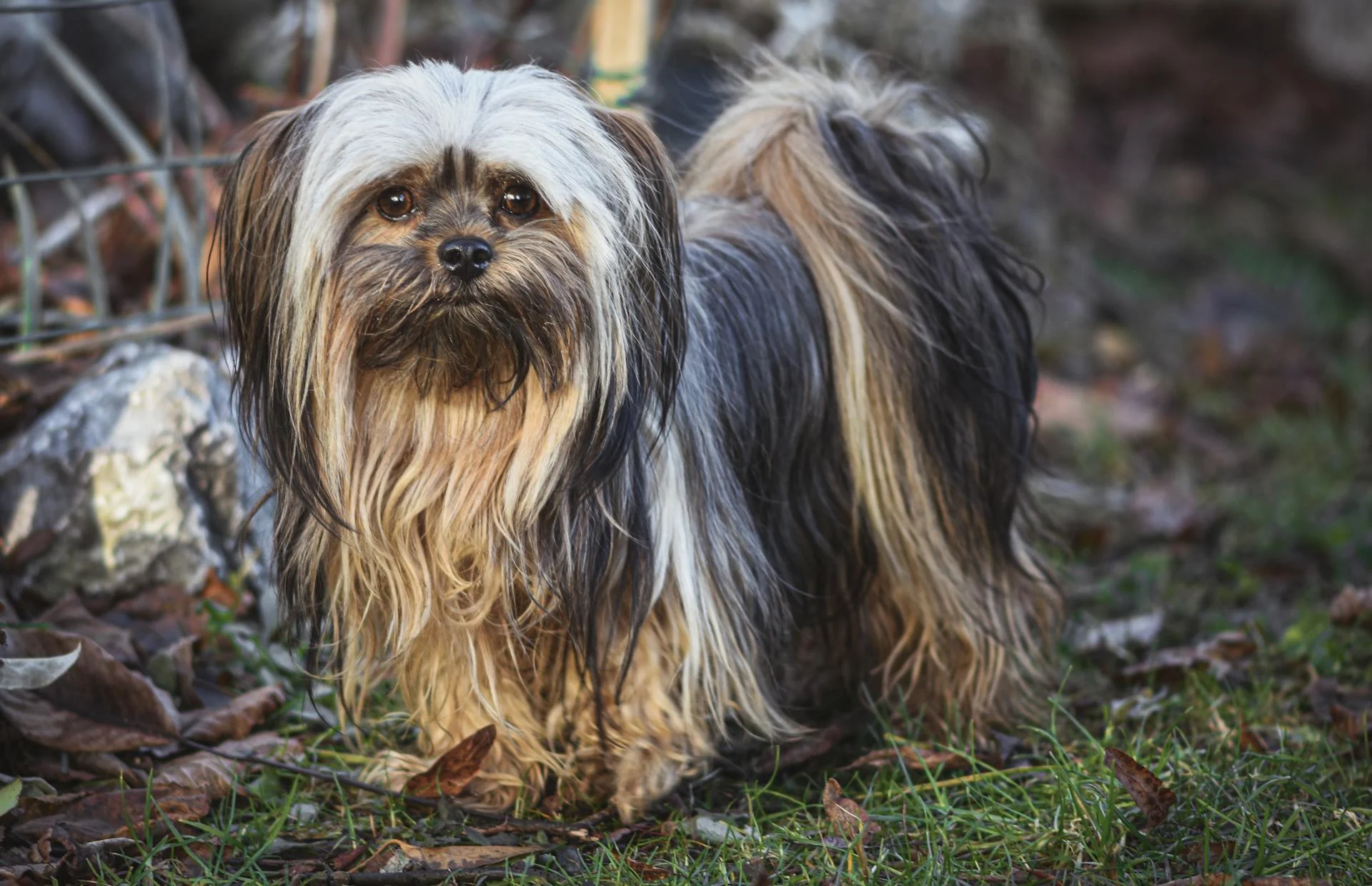
The Tibetan Dog Lhasa Apso is a beloved breed known for its long, beautiful coat and gentle nature. They originated in the Himalayas, where they were bred as temple dogs to guard and protect.
These dogs are relatively small, weighing between 13-18 pounds and standing 10-11 inches tall. They have a thick double coat that sheds heavily, requiring regular grooming.
Lhasa Apsos are known for their independence and strong will, making them a challenge for inexperienced dog owners. They are highly intelligent and trainable, but they can be stubborn at times.
Despite their strong personality, Lhasa Apsos are loyal and loving companions, thriving on attention and interaction with their family.
Expand your knowledge: Strongest Dog Names
Care and Maintenance
The Lhasa Apso's long, elegant coat requires regular care to prevent matting and tangling.
This beautiful coat needs to be brushed daily to prevent mats and tangles, and bathing should take place every one to two weeks. You can use an anti-static spray or detangler to make the process easier.
The Lhasa Apso's brachycephalic facial structure and small size make them more susceptible to dental disease, so regular dental care is essential. Brush their teeth frequently with a vet-approved pet toothpaste.
A daily walk or exercise is necessary to maintain their fitness, but they aren't overly active even in small living spaces.
To keep their coat looking its best, many owners choose to have it professionally clipped every six weeks. However, this doesn't eliminate the need for daily grooming.
Here are some key grooming tasks to keep in mind:
- Brush coat daily
- Bathe every one to two weeks
- Trim nails as needed (usually every week or two)
- Brush teeth frequently with a vet-approved pet toothpaste
Regular ear, eye, and skin care are also important to prevent infections and other issues.
Health and Wellness
Lhasa Apsos are prone to genetic health problems, just like any other breed of dog. Hip dysplasia, patellar luxation, juvenile renal disease, intervertebral disc disease, and eye problems like progressive retinal atrophy, dry eye, and glaucoma are all potential issues.
A reputable breeder should be able to provide written documentation that the parents of the puppy have been screened for these defects and deemed healthy for breeding. This includes OFA hip and patella clearances and certification from the Canine Eye Registry Foundation.
To help support your Lhasa Apso's overall good health, consider adding a reputable probiotic supplement, such as Great Poop, to their diet. This can help boost their gut health and provide immune system support.
For your interest: Hip Dysplasia Bernese Mountain Dog
Nutritional Tips
Lhasa Apsos require a complete and balanced diet, which can be achieved by feeding an Association of American Feed Control Officials (AAFCO) kibble or wet food.
Feeding your Lhasa Apso at regular intervals is crucial, so adult dogs should be fed twice a day, and puppies at least three times a day to prevent low blood-sugar levels.
The recommended caloric intake for Lhasa Apsos varies based on physical size, metabolism, neuter status, and activity level, so it's best to consult with your veterinarian to determine the right amount of food.
Adding omega-3 fatty acids (DHA/EPA) to your Lhasa Apso's diet can be beneficial, as they act as natural anti-inflammatories that support skin, coat, kidneys, joints, and heart health.
Your veterinarian can recommend the best way to add these fatty acids, whether through supplements, fish oil, or specially formulated dog foods.
On a similar theme: Best Dog Food for Gassy Dogs
Health Essentials
Genetic health problems can affect any breed, including Lhasa Apsos, so it's essential to find a reputable breeder who prioritizes health.
A reputable breeder will be honest about health problems in the breed and provide written documentation of health clearances for the parents of the puppy.
Some common health issues in Lhasas include hip dysplasia, patellar luxation, and eye problems like progressive retinal atrophy and glaucoma.
You can help support your Lhasa Apso's overall good health with a probiotic supplement like Great Poop, an American-made chew suitable for dogs over 12 weeks old.
Keeping your Lhasa at an appropriate weight is one of the easiest ways to extend their life and prevent obesity.
Adding omega-3 fatty acids to your Lhasa's diet can help support skin, coat, kidneys, joints, and heart health.
For your interest: Japanese Chin Dog Health Problems
Breed
The Lhasa Apso breed has a rich history that dates back thousands of years. They were developed by Buddhist monks in the mountains of Tibet to serve as sentinels for temples and monasteries.
Their original lineage is likely lost to history, but some experts believe they may be descended from the larger Tibetan Terriers. Others think there may be a northern component to the breed.
Recent DNA studies indicate that the Lhasa Apso is one of the breeds most closely related to their wolf-like ancestors. This suggests that they may have been bred from a variety of mountain wolf.
The Lhasa Apso was bred exclusively by the monks for their ability to withstand the cold, keen sense of hearing, and good judgment to determine who was friend and who was foe.
They were carefully guarded by the monks from outside influence, and were never sold. However, the Dalai Lamas did occasionally present a pair of these elegant dogs to Imperial families and visiting dignitaries.
The Lhasa Apso is longer than they are tall, with a narrow, domed skull and a medium to short muzzle. Their fur hangs over their face and frequently hides their small, alert eyes.
Their traditional show coat is long, heavy, and straight, and it hangs down, covering their face and often reaching down to the ground. They come in many colors, from black to white and anything in between.
The Lhasa Apso's long, thick coat helps them stay warm in the freezing Himalayan temperatures, living up to 13,000 feet above sea level. They typically weigh 12-18 pounds and can thrive for around 15 years with proper care.
The Lhasa Apso was introduced to the United States in 1933, when the 13th Dalai Lama presented a group of the little dogs to Mr. and Mrs. Suydam Cutting of New Jersey.
Temperament
The Lhasa Apso is a complex breed with a unique temperament. They're naturally wary of strangers and can be very protective of their family, which can lead to loud barking.
Their independent nature can make them stubborn, and they're not easily trained. They're known to be bossy and possessive of their belongings.
Despite their aloofness around strangers, Lhasas are generally affectionate with their family members. They make excellent companions and "lap dogs" for people of all ages.
These dogs have a strong prey drive, which can make them difficult to walk, especially around small animals like cats. They may bolt at the sight of these animals, so it's essential to socialize them well.
Lhasas are intelligent and energetic, requiring regular exercise to keep them happy and healthy. They can self-exercise, racing around the house, but they also need simple walks around the block.
Their temperament is not suited for homes with very small or rambunctious children, as they may not be patient with them. However, with proper socialization and training, they can thrive in a family environment.
It's essential to start training your Lhasa puppy from an early age, ideally from 10 weeks old. This will help prevent unwanted behaviors like barking and digging.
See what others are reading: Dog Barking at Other Dogs While Walking
Fun Activities
Lhasa Apsos are intelligent dogs that need regular exercise and mental stimulation to thrive. They love to engage in fun activities that challenge their minds and bodies.
Fetch is a great way to get your Lhasa Apso running around and burning off energy. It's a simple yet effective way to provide exercise and mental stimulation.
Hiking in the mountains is another activity that Lhasa Apsos love. They're well-suited for high-altitude hiking due to their thick coats and sturdy build.
Obedience training is essential for any dog, and Lhasa Apsos are no exception. It helps them learn basic commands and behave well in public.
Agility training can be a fun way to challenge your Lhasa Apso's physical abilities and provide mental stimulation. It involves navigating obstacles like tunnels and jumps.
Scent work is a great activity for Lhasa Apsos to engage in, as it utilizes their keen sense of smell. It can be a fun and rewarding way to challenge their minds.
Here are some fun activities for your Lhasa Apso to consider:
- Fetch
- Hiking in the mountains
- Obedience training
- Agility
- Scent work
Adoption and Ownership
Adopting a Tibetan dog Lhasa Apso can be a rewarding experience, especially when done through reputable channels. You can start by searching online platforms like Petfinder.com and Adopt-a-Pet.com to find a Lhasa Apso in your area.
Talking to local experts, such as vets, dog walkers, and groomers, can also help you find a dog that's the perfect companion for your family. They often have connections with pet owners who are looking to rehome their dogs.
Networking with breed clubs and rescue organizations can also be a great way to find a healthy and well-cared-for Lhasa Apso. The American Lhasa Apso Club's rescue network can help you find a dog that's a good match for your family.
Choosing a Breeder
When choosing a breeder, it's essential to do your research. Research local breeders to find one that's reputable and experienced.
Look for breeders who are registered with a national kennel club, such as the American Kennel Club (AKC). This ensures they follow strict breeding standards.
See what others are reading: American Kennel Club Lancashire Heeler
Ask about health clearances for the parents of the puppy you're interested in. A breeder who's transparent about health clearances is a good sign.
Check for licenses and permits from local authorities. A licensed breeder is more likely to follow regulations and prioritize animal welfare.
Consider visiting the breeder in person to meet the parents of the puppy and see the breeding facility. This can give you a sense of the breeder's operation and the care they provide.
Adopting a Dog from a Shelter
Adopting a dog from a shelter can be a wonderful way to bring a new furry friend into your life. You can search for a Lhasa Apso on websites like Petfinder.com and Adopt-a-Pet.com, which allow you to be very specific in your requests.
These websites can have you searching for a Lhasa Apso in your area in no time flat. You can also search for animal rescue groups in your area on AnimalShelter.org. Local newspapers often have "pets looking for homes" sections you can review.
Social media is another great way to find a dog. Post on your Facebook page that you are looking for a specific breed so that your entire community can be your eyes and ears. This can help you find a dog that may be the perfect companion for your family.
Reach out to local experts like vets, dog walkers, and groomers about your desire for a Lhasa Apso. They often know people who are looking to give up their dogs and can recommend a good match. Most people who love Lhasa Apsos love all Lhasa Apsos, so breed clubs have rescue organizations devoted to taking care of homeless dogs.
The American Lhasa Apso Club's rescue network can help you find a dog that may be the perfect companion for your family. You can also search online for other Lhasa Apso rescues in your area. Breed rescue groups tend to be very upfront about any health conditions the dogs may have and are a valuable resource for advice.
Before bringing home a pup, ask shelter or rescue group staff or volunteers about the dog's personality, how he responds to other animals and people, and if he has any known health issues. Make sure you have a good contract with the seller, shelter, or rescue group that spells out responsibilities on both sides.
Discover more: Good Companion Dogs
Frequently Asked Questions
What two breeds make a Lhasa Apso?
The Lhasa Apso is a cross between the Tibetan terrier and other herding-type Tibetan dogs. Its ancestry is rooted in ancient Tibetan breeds.
What is the cost of a Lhasa Apso?
A Lhasa Apso typically costs between $500 and $1000 from a reputable breeder. Learn more about the factors that influence the price of this adorable breed.
What does Lhasa Apso mean in Tibetan?
The name "Lhasa Apso" roughly translates to "lion dog" in Tibetan, referring to the breed's original purpose as a companion animal for Tibetan royalty and nobility. This name reflects the breed's historical association with the power and majesty of the lion.
What is the mythology of the Lhasa Apso?
The Lhasa Apso is associated with the mythical Snow Lion, a guardian of Tibet, and is said to possess similar protective qualities. This ancient mythology is deeply rooted in Tibetan culture and tradition.
What is the ancestry of the Lhasa Apso?
The Lhasa Apso's ancestry dates back over 4000 years to the Tibetan mountains, where they share a common wolf-like heritage with the Tibetan Spaniel and Tibetan Terrier. Recent DNA testing confirms their ancient roots.
Featured Images: pexels.com

